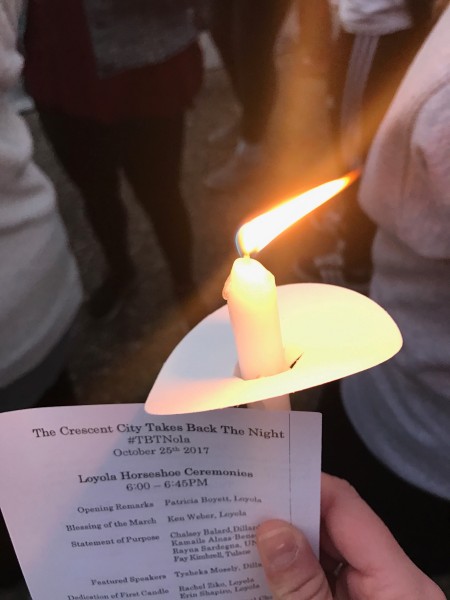Take Back the Night event gives platform for sexual assault survivors

Carrigan English | Staff Photographer
The march on Loyola University New Orleans’ campus was illuminated with candlelight in support of victims of sexual assault.
On Wednesday night, Loyola University New Orleans’ campus was illuminated with candlelight as people marched and chanted in support of sexual violence survivors at the annual Take Back the Night event.
Hosted by Dillard University on Loyola’s campus, Crescent City’s Take Back the Night is a yearly event that aims to bring attention to sexual violence and domestic abuse. Each year, participants march through populated areas of Uptown New Orleans to symbolically “take back the night” from sexual violence perpetrators and give it back to sexual violence survivors.
The event began with speeches given by university faculty from Tulane, Loyola, Dillard and Xavier Universities. The primary topic of this year’s event highlighted the fact that sexual violence affects all genders. Speakers also emphasized the importance of valuing this one night of symbolism, while also making sure it turns into many days of action.
Take Back the Night was co-sponsored by the Newcomb College Institute, which began its preparations weeks in advance. NCI held various events of its own, such as poster-making and tabling, to inform the Tulane community about the event and let students know they had the chance to speak out if they chose.
Julie Engel, the graduate assistant for student leadership and engagement at NCI, said she was impressed with the event as a whole and the opportunities it presented for students.
“I was very happy to be involved with the planning of this. I feel like it was something that I got a lot out of personally, especially by helping with Newcomb,” Engel said. “I think it is a platform for people to speak out in a way that they may not have the opportunity to otherwise, since anyone does have the opportunity to speak and share their story, but there is not a pressure to at the same time.”
Freshman Ellie Golding said one of the strong points of the event was not only the openness for survivors to share their stories, but the willingness they had to stand up and speak.
“I wish there had been more time at the end,” Golding said. “I think six or seven people spoke, but I know more people were willing to share.”
The event focused on gender-based sexual violence as a whole, and the speakers ensured the audience knew the duty of stopping sexual violence and rape culture should not fall on the survivors. While it was clear that many of the speakers shared these sentiments, sophomore Simran Jain, a member of Sexual Aggression Peer Hotline and Education, thought there may have been a perceived discrepancy in some of the messages.
“There was one side of the people saying break the silence and the other half saying that survivors don’t owe you their story,” Jain said. “Both of these things are true, and both of these things can work with one another. It’s based on how you want to experience your healing process.”
Though many students agreed with the intentions of Take Back the Night, some students said they believed there was not enough diversity involved within the event. Jain felt like there could have been a more intentional conversation about race and sexual assault.
“As [people] of color on campus, we are so used to it not getting addressed that it is a norm,” Jain said. “… The speakers in general were representative, but the conversation wasn’t representative … I think if we are going to say break the silence then we also have to say that doesn’t mean survivors break the silence, it means let’s start talking about sexual violence.”
Your donation will support the student journalists of Tulane University. Your contribution will allow us to purchase equipment and cover our annual website hosting costs.
















Leave a Comment